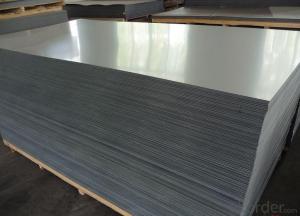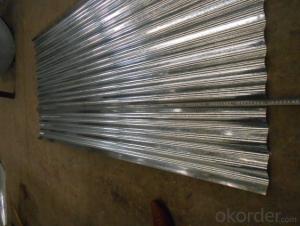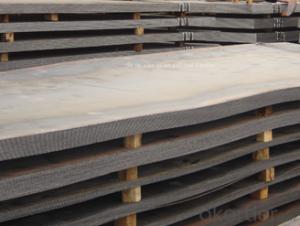Galvanised Steel sheets
- Loading Port:
- China Main Port
- Payment Terms:
- TT OR LC
- Min Order Qty:
- -
- Supply Capability:
- -
OKorder Service Pledge
OKorder Financial Service
You Might Also Like
Product Description:
Product Description:
Hot Dipped Galvanized Steel Coil
Hot-dip galvanized steel coils are available with a pure zinc coating through the hot-dip galvanizing process. It offers the economy, strength and formability of steel combined with the corrosion resistance of zinc. The hot-dip process is the process by which steel gets coated in layers of zinc to protect against rust. It is especially useful for countless outdoor and industrial applications.
Product Description Of Hot Dipped Galvanized Steel Coil
Thickness | 0.13mm-0.7mm |
Width | 600mm-1250mm |
Zinc Coating | 30-200g/m2 |
Internal Diameter | 508mm/610mm |
Coil Weight | 3-12MT |
Quality | commercial and structural quality |
Surface Treatment | regular & minimum spangle, zero spangle, oiled & dry, chromated , non-skin pass , skin pass |
Standard | JIS G 3302, ASTM A 653M, EN 10327 |
Steel Grade | SGCC, CS, FS, SS, LFQ, DX51D+Z , S280GD |
Technical Data Of Hot Dipped Galvanized Steel Coil
Chemical Composition | C | Si | Mn | P | S |
0.04-0.06% | 0.01-0.03% | 0.18-0.22% | 0.014-0.016% | 0.006%-0.009% |
Yield Strength | (Mpa) 280-320 |
Tensile Strength | (Mpa) 340-390 |
Elongation | 20%-30% |
Out-of-square | not exceed 1% Flatness |
Bow | 15mmmax |
Edge Wave | 9mmmax |
Centre Buckle | 8mmmax |
Bending At 180 Degree | No crack, purling and fraction |
Application Of Hot Dipped Galvanized Steel Coil
It can be widely used in transportation, light industry, civil usage and farming. It is also the perfect building material in construction for making roofing tile, steel profiles for wall partition, T-bar, studs, fireproof door, air conditioning duct and home appliance.
- Q:How do steel sheets compare to other sheet materials like aluminum or stainless steel?
- Steel sheets have several advantages over other sheet materials like aluminum or stainless steel. Firstly, steel sheets are known for their exceptional strength and durability. They can withstand heavy loads and are resistant to impact, making them ideal for applications that require high strength and stability. Aluminum sheets, on the other hand, are relatively softer and less resistant to impacts, making them more suitable for lightweight applications. Secondly, steel sheets offer excellent corrosion resistance. While stainless steel sheets also possess this characteristic, steel sheets can be coated with protective layers or galvanized to enhance their corrosion resistance even further. This makes steel sheets more suitable for outdoor applications or environments with high humidity or exposure to harsh chemicals. Aluminum sheets, on the contrary, are prone to corrosion and typically require additional coating or treatment for protection. Moreover, steel sheets are more cost-effective compared to aluminum or stainless steel sheets. Steel is widely available and has a lower production cost, making steel sheets a more affordable option for many industries. Aluminum sheets, on the other hand, tend to be more expensive due to the higher cost of the raw material and the manufacturing process involved. Stainless steel sheets are also relatively expensive due to the additional alloying elements present in their composition. Lastly, steel sheets offer excellent fire resistance. They have a high melting point and do not easily catch fire or contribute to the spread of flames. This makes steel sheets the preferred choice for applications that require fire safety, such as construction or transportation. In summary, steel sheets stand out due to their exceptional strength, durability, corrosion resistance, cost-effectiveness, and fire resistance. While aluminum and stainless steel sheets have their own unique properties and applications, steel sheets are often favored for their superior overall performance in various industries.
- Q:Can steel sheets be used for automotive applications?
- Yes, steel sheets can be used for automotive applications. Steel is a common material used in the automotive industry due to its strength, durability, and cost-effectiveness. It is often used for body panels, chassis, and other structural components in vehicles.
- Q:Are steel sheets suitable for decorative screens or partitions?
- Indeed, decorative screens or partitions can be made using steel sheets. The versatility of steel as a material allows for a wide array of design possibilities. Intricate patterns and designs can be achieved through cutting, shaping, and welding steel. Furthermore, steel is known for its durability and long-lasting nature, making it suitable for both indoor and outdoor applications. To cater to different aesthetic preferences, steel can be painted or powder-coated in various colors. In addition to providing privacy, steel screens or partitions also enhance the visual appeal of a space. In summary, steel sheets offer immense potential for creating decorative screens or partitions due to their adaptability, resilience, and aesthetic capabilities.
- Q:What are the problems encountered in the construction of steel sheet piles? How to deal with
- Steel sheet pile and fill ground segment into the process by the lateral extrusion force of different rocks are prone to deviation, take the following measures to rectify the deviation in the deflection position of the steel sheet pile to pull l.0m ~ 2.0m, and then down into the hammer, so the up and down reciprocating vibration extracting several times, can make the big stone shattered or the displacement, make steel sheet pile position is correct, reduce the inclination of the steel sheet pile.
- Q:What is the average fire rating for steel sheets?
- The fire rating of steel sheets can differ based on different factors, including sheet thickness, steel type, and fire testing standards. Generally, steel sheets have fire ratings between 30 minutes and 2 hours. However, it's worth noting that fire ratings can be improved by adding fire-resistant materials or applying fire-resistant coatings to the sheets. To determine the precise fire rating for a specific steel sheet, it is advisable to seek guidance from fire safety professionals or consult the relevant fire testing standards.
- Q:What is the difference between a pre-annealed and full hard steel sheet?
- A pre-annealed steel sheet is a steel sheet that has undergone the annealing process. This process includes heating the steel to a specific temperature and then cooling it slowly. By doing so, internal stresses in the steel are relieved and its ductility and workability are improved. Consequently, pre-annealed steel sheets possess greater formability and are more easily shaped and manipulated compared to their non-annealed counterparts. On the flip side, a full hard steel sheet has not been subjected to the annealing process and maintains its original hardness and strength. These sheets are commonly used in applications that necessitate high strength, durability, and resistance to deformation. They are less ductile and more rigid, which makes them suitable for situations where shape retention and stiffness are crucial, such as in automotive components or structural supports. In conclusion, the primary distinction between pre-annealed and full hard steel sheets lies in their formability and strength characteristics. Pre-annealed steel sheets are more malleable and easier to shape, while full hard steel sheets offer greater strength and rigidity. The choice between the two depends on the specific requirements of the application and the desired balance between formability and strength.
- Q:Are steel sheets prone to warping or bending over time?
- Steel sheets are generally not prone to warping or bending over time due to their high strength and durability. However, factors such as excessive heat or improper handling can potentially cause distortion or deformation in steel sheets.
- Q:How thick are steel sheets typically?
- Steel sheets can vary in thickness depending on their intended use, but they typically range from 0.5 to 6 millimeters thick.
- Q:How do steel sheets compare to other materials like aluminum or stainless steel?
- Steel sheets are known for their high strength and durability, making them an excellent choice for various applications. When compared to aluminum, steel sheets are generally stronger and more resistant to impact and bending. Stainless steel, on the other hand, offers superior corrosion resistance and hygiene properties. Ultimately, the choice between steel sheets, aluminum, or stainless steel depends on the specific requirements of the project or application.
- Q:How are steel sheets used in construction?
- Steel sheets are commonly used in construction for various applications such as roofing, cladding, and structural components. They provide strength, durability, and resistance to various weather conditions, making them ideal for creating sturdy frameworks, walls, and roofs in buildings and infrastructure projects. Steel sheets can be fabricated into different shapes and sizes, allowing for versatile use in construction projects.
1. Manufacturer Overview |
|
|---|---|
| Location | |
| Year Established | |
| Annual Output Value | |
| Main Markets | |
| Company Certifications | |
2. Manufacturer Certificates |
|
|---|---|
| a) Certification Name | |
| Range | |
| Reference | |
| Validity Period | |
3. Manufacturer Capability |
|
|---|---|
| a)Trade Capacity | |
| Nearest Port | |
| Export Percentage | |
| No.of Employees in Trade Department | |
| Language Spoken: | |
| b)Factory Information | |
| Factory Size: | |
| No. of Production Lines | |
| Contract Manufacturing | |
| Product Price Range | |
Send your message to us
Galvanised Steel sheets
- Loading Port:
- China Main Port
- Payment Terms:
- TT OR LC
- Min Order Qty:
- -
- Supply Capability:
- -
OKorder Service Pledge
OKorder Financial Service
Similar products
New products
Hot products
Related keywords






























